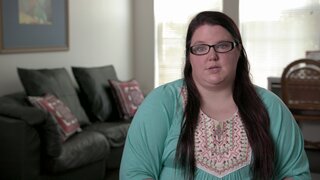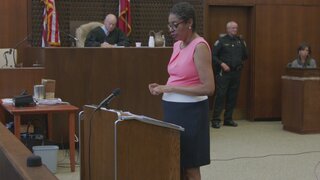Create a free profile to get unlimited access to exclusive videos, breaking news, sweepstakes, and more!
Eight Things To Know About The Quinton Tellis Retrial In The Jessica Chambers Case
Even though the outcome was the same, the second trial was very different than the first.
A second jury failed to unanimously decide whether Quinton Tellis is guilty of killing 19-year-old Jessica Chambers nearly four years ago.
The case began on December 6, 2014 in Courtland, Mississippi. First responders found Chambers walking toward them from a wooded area 30 to 40 feet from her burning car. More than 93 percent of her body was covered in second and third-degree burns. Chambers would die at a Memphis hospital six hours later.
While at the crime scene, multiple first responders said Chambers told them, “Eric did this,” “Eric set me on fire” and “Eric” when asked who did this to her.
Last fall, in Tellis’ first trial, prosecutors tried to link him to the crime through cell phone data and text messages, claiming he also lied to police. He was questioned four days after Chambers was set on fire and denied seeing her that night. An intelligence analyst from the U.S. Department of Justice, who was part of the task force investigating Chambers’s death, claimed that the phone data showed they were together in the hours just before Chambers was set on fire.
The defense maintained that Chambers named her attacker before she died and that it wasn’t Tellis. A jury was divided over the evidence—a division they couldn’t overcome. The trial resulted in a hung jury with a split of seven voting guilty and five voting not guilty.
This fall, with a different jury but largely the same evidence, the same division played out, resulting in another hung jury. Here is what stood out the second time around and what could be next for Quinton Tellis.
1. There were allegations of prosecutorial misconduct before the second trial
Before the trial even began, there were some tense moments in the courtroom at a July 9, 2018 hearing. Tellis’ defense attorney Darla Palmer made allegations of misconduct against District Attorney John Champion that he vehemently denied. The defense wanted Champion’s office removed from the case and sanctions imposed. On July 2, 2018, Palmer filed a motion with a supporting affidavit that accused John Champion of pressuring a potential witness, Jalen Caudle to testify falsely. Caudle claimed that Champion wanted him to say that Tellis told Jessica his name was Eric, the same name that Chambers identified as the person who set her on fire.
Caudle, who Palmer also represents, testified against Champion claiming that the two met at the jail without Palmer’s knowledge, and that Champion pressured him to help him in the upcoming trial against Tellis in exchange for leniency in his own case. Caudle is charged with capital murder in a separate case, and is awaiting his trial.
“He said he wanted me to get up on the stand and say that Q [Quinton Tellis] told him when he first met Jessica he told her that his name was Eric,” Caudle said in that testimony. First responders testified during Tellis’ first trial that Chambers said that “Eric” had set her on fire. Caudle testified that he had no idea if Tellis ever went by “Eric.”
Palmer and co-counsel Alton Peterson argued that Champion’s misconduct could prejudice Tellis’ upcoming retrial.
Champion claimed that Caudle made the story up and lied under oath.
After a day-long hearing into the alleged misconduct, Judge Gerald Chatham denied the defense motion and said he heard no evidence of prosecutorial misconduct that would prejudice the retrial. Additionally, he said his courtroom is not the proper venue for determining sanctions if any misconduct did occur on the part of the District Attorney. The judge was referring to the Mississippi State Bar that has procedures in place to handle claims of attorney misconduct.
2. There were allegations of witness intimidation during the second trial
A few new witnesses for the prosecution were called in the retrial. One new witness was Sherry Flowers. Prosecutors called the Courtland, Mississippi resident to testify that she gave a ride to a man on December 6, 2014—the night Chambers, then 19, was set on fire. She picked him up not far from the crime scene and dropped him off on the street close to where Tellis’ sister lived at the time. Although Flowers never identified Tellis as the man she picked up, prosecutors argued that it was Tellis.
Outside the courthouse, as Flowers was leaving, there was concern that someone was trying to intimidate Flowers. Panola County Sheriff Dennis Darby said that police questioned a person who may have been trying to intimidate the woman. That person allegedly followed Flowers after she left the courtroom following her testimony, according to the Commercial Appeal in Memphis, Tennessee.
However, Darby later said that it was all a false alarm, the Commercial Appeal later reported.
Legal analyst Beth Karas interviewed the man, Harvey Flowers, who was erroneously targeted. He is related to Sherry Flowers by marriage and said he had no idea she was even testifying. Harvey Flowers is a bounty hunter and volunteer firefighter. He told Karas he knows most of the first responders who testified in the case.
3. There was an alleged contempt of court
As the retrial wrapped up, and as jurors begin their second day of deliberation, Circuit Judge Gerald Chatham made a startling announcement. Someone had smuggled a cell phone camera into the courtroom on September 30 and snapped photos of the jury, according to legal analyst Beth Karas who was in the courtroom when a stern judge took the bench. Those photos were posted on Facebook.
"That person will be arrested," he said. "This serves as your warning."
Nobody, in the end, was arrested. Police later said that the person who took photos was identified but, in the end, will not face charges, according to FOX13 in Memphis. She was interviewed by police, who said they didn’t find a picture of the jury in her possession. It is unclear if she even snapped a photo and where the rumor started that a photo of the courtroom somehow ended up on social media.
4. Chambers’ ability to speak remained a sticking point
A speech pathologist was one of the first witnesses called by the prosecution during the retrial. Dr. Carolyn Wiles Higdon, a speech pathologist and professor in the Communication Sciences and Disorders Department of the University of Mississippi, testified that Chambers would have been unable to speak after being set on fire. This testimony contradicts multiple first responder witness accounts. Higdon testified that having injured lungs, an injured mouth and an injured larynx, as Chambers did, affect the ability to make an articulate sound.
However, the defense remained adamant that Chambers did, in fact, speak before her death and that there were plenty of witnesses to prove it. Palmer began her opening statements by emphasizing how emergency personnel heard the dying Chambers blame "Eric.” She tried to drive home this fact yet again by stating that Chambers was alert enough to respond to questions and identify herself and her killer. “She walked and she talked," Palmer said, adding that Chambers did not implicate Tellis.
5. Testimony suggested Chambers was assaulted before being burned
New testimony from Dr. William Hickerson, a physician with expertise in burn patients, revealed that Chambers had bruises on her front torso not caused by the fire. This fits the prosecution’s theory that Tellis struggled with Chambers just before she became unconscious, as reported by legal analyst Beth Karas. Dr. Hickerson, who testified at the first trial, did not mention any bruises at that time. The autopsy report also makes no reference to bruising separate from the severe burns covering most of Chambers’ body.
6. There was another deadlocked jury
History repeated itself during the retrial. Once again, the jury could not reach a unanimous verdict as to whether Tellis was responsible for killing Chambers. According to defense attorney Darla Palmer, the jurors were split 6-6 on the verdict.
“We’re disappointed the jury didn’t find him not guilty. The ball is now in the court of the district attorney,” defense attorney Alton Peterson said, according to the Clarion Ledger.
Before the jury began deliberating, prosecutors said in their closing statements that evidence links Tellis to Chambers' death and that he lied to investigators. The defense emphasized testimony by emergency workers that they heard a dying Chambers say someone named Eric attacked her and that prosecutors concocted a complicated theory that makes Tellis look like a "supercriminal."
7. Tellis is back in a Louisiana prison
Tellis has returned to Louisiana, where he is a suspect in another slaying. Oxygen.com has confirmed that he is in the Louisiana State Penitentiary. Tellis has not been charged with first-degree murder in the 2015 death of Ming-Chen Hsiao, who was killed in Louisiana, but he is a suspect in her death, Oxygen legal analyst Beth Karas said. A police official from the Monroe Police Department in Louisiana told Oxygen.com that there is an active warrant out for his arrest for the first-degree murder of Hsiao. "The warrant hasn't been executed — meaning Tellis hasn't been arrested and charged," Karas told Oxygen.com.
The next step would be for the district attorney to present evidence to a grand jury. The grand jury will decide whether or not to vote an indictment. Assistant District Attorney Geary Aycock told The News-Star of Monroe that a decision hasn't been made on trying Quinton Tellis there.
8. Tellis could face a third trial for Chambers’ death
District Attorney John Champion has hinted to reporters that there may be a third trial after Louisiana finishes its case with Quinton Tellis, according to the Commercial Appeal.
[Photo: Associated Press]


























